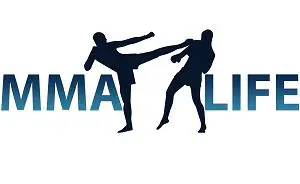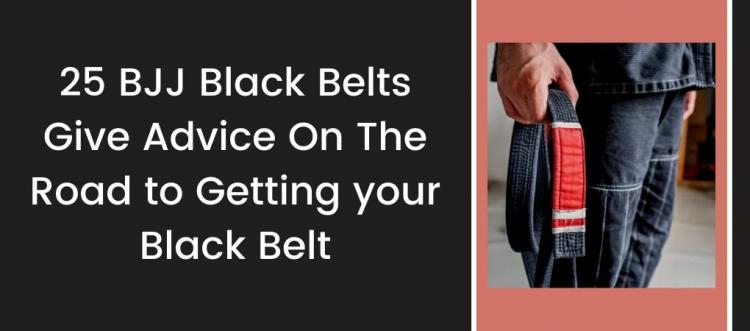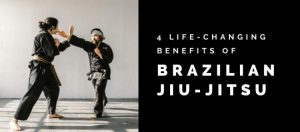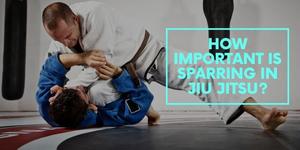The road to getting your black belt is a long and tedious one. Many fail and quit as early as blue belt, and few actually stay to go any further. Everyone has to start out somewhere, and it is good to set goals, especially in a sport like this. You have to be a different kind of crazy to want to get beat up day after day to inch yourself closer to attaining that black belt.
To help you on your journey, whether you feel unmotivated to train or have hit a plateau that you can’t seem to get out of, here are 25 black belts giving their advice on the road to getting your blackbelt.
- John Danaher on the true meaning of getting your blackbelt
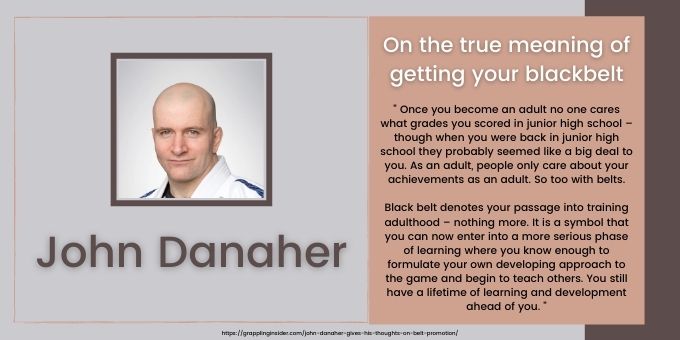
Once you become an adult no one cares what grades you scored in junior high school – though when you were back in junior high school they probably seemed like a big deal to you. As an adult, people only care about your achievements as an adult. So too with belts.
Black belt denotes your passage into training adulthood – nothing more. It is a symbol that you can now enter into a more serious phase of learning where you know enough to formulate your own developing approach to the game and begin to teach others. You still have a lifetime of learning and development ahead of you.

2. Saulo Ribiero on progression
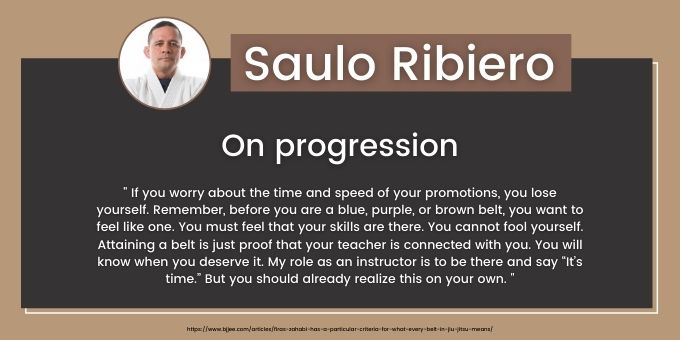
If you worry about the time and speed of your promotions, you lose yourself. Remember, before you are a blue, purple, or brown belt, you want to feel like one. You must feel that your skills are there. You cannot fool yourself. Attaining a belt is just proof that your teacher is connected with you. You will know when you deserve it. My role as an instructor is to be there and say “It’s time.” But you should already realize this on your own.
3. Firas Zahabi on promotions
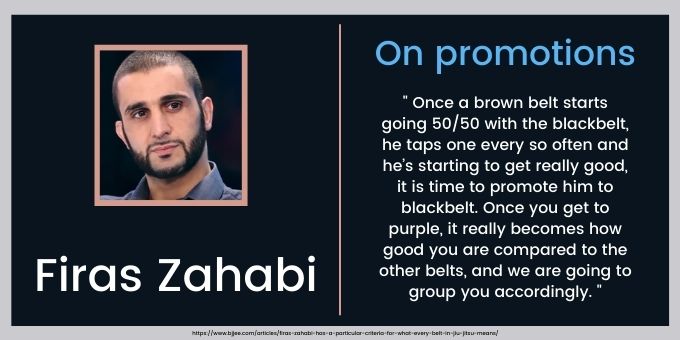
Once a brown belt starts going 50/50 with the blackbelt, he taps one every so often and he’s starting to get really good, it is time to promote him to blackbelt. Once you get to purple, it really becomes how good you are compared to the other belts, and we are going to group you accordingly.
4. Chris Haueter on seeing the bigger picture
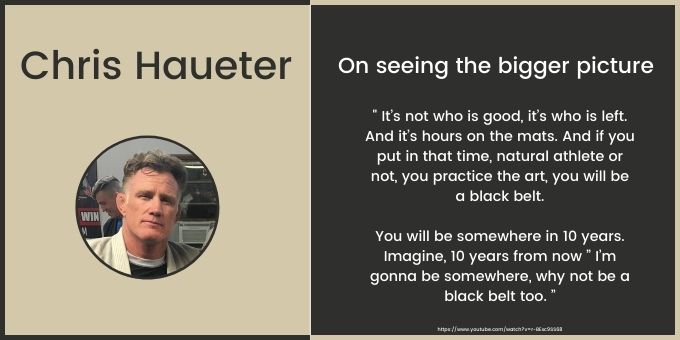
It’s not who is good, it’s who is left. And it’s hours on the mats. And if you put in that time, natural athlete or not, you practice the art, you will be a black belt.
You will be somewhere in 10 years. Imagine, 10 years from now ” I’m gonna be somewhere, why not be a black belt too”
5. Rickson Gracie on the training mindset
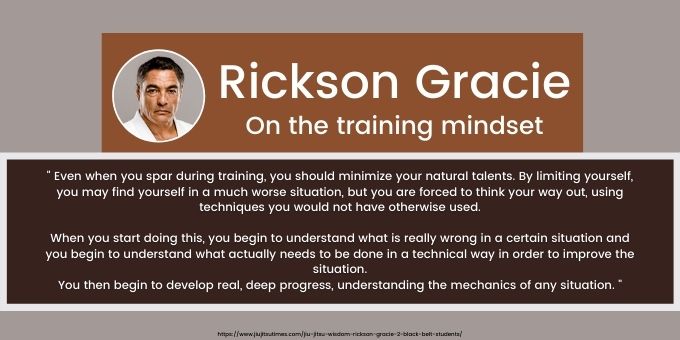
Even when you spar during training, you should minimize your natural talents. By limiting yourself, you may find yourself in a much worse situation, but you are forced to think your way out, using techniques you would not have otherwise used.
When you start doing this, you begin to understand what is really wrong in a certain situation and you begin to understand what actually needs to be done in a technical way in order to improve the situation.
You then begin to develop real, deep progress, understanding the mechanics of any situation.
6. Keenan Cornelius on drilling
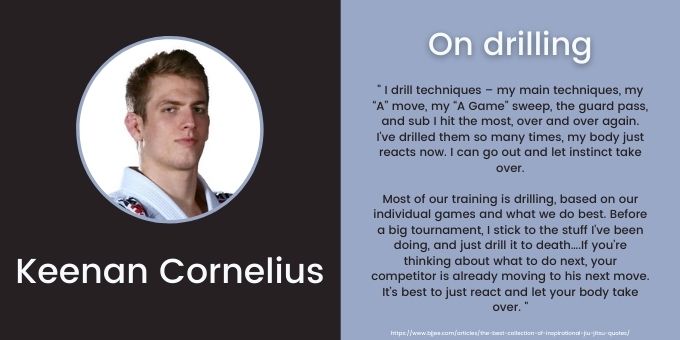
I drill techniques – my main techniques, my “A” move, my “A Game” sweep, the guard pass, and sub I hit the most, over and over again. I’ve drilled them so many times, my body just reacts now. I can go out and let instinct take over.
Most of our training is drilling, based on our individual games and what we do best. Before a big tournament, I stick to the stuff I’ve been doing, and just drill it to death….If you’re thinking about what to do next, your competitor is already moving to his next move. It’s best to just react and let your body take over.
7. Tom De Blass on staying motivated at black belt
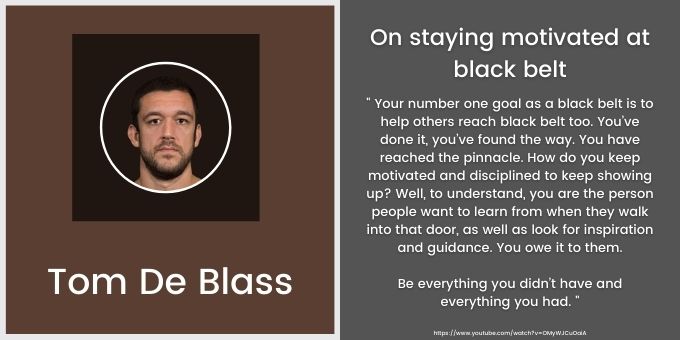
Your number one goal as a black belt is to help others reach black belt too. You’ve done it, you’ve found the way. You have reached the pinnacle. How do you keep motivated and disciplined to keep showing up? Well, to understand, you are the person people want to learn from when they walk into that door, as well as look for inspiration and guidance. You owe it to them.
Be everything you didn’t have and everything you had.
8. Joe Rogan on the recipe for getting better
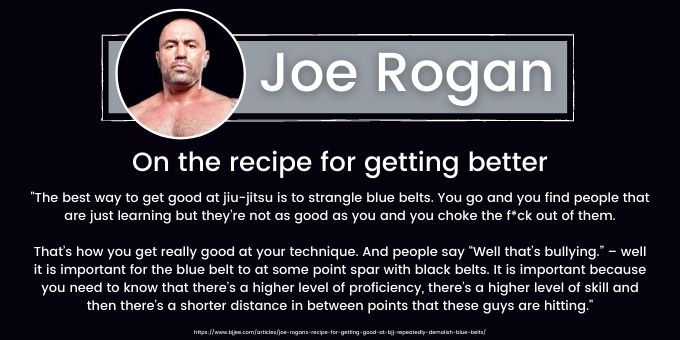
The best way to get good at jiu-jitsu is to strangle blue belts. You go and you find people that are just learning but they’re not as good as you and you choke the f*ck out of them.
That’s how you get really good at your technique. And people say “Well that’s bullying.” – well it is important for the blue belt to at some point spar with black belts. It is important because you need to know that there’s a higher level of proficiency, there’s a higher level of skill and then there’s a shorter distance in between points that these guys are hitting.
9. Relson Gracie on repetitions
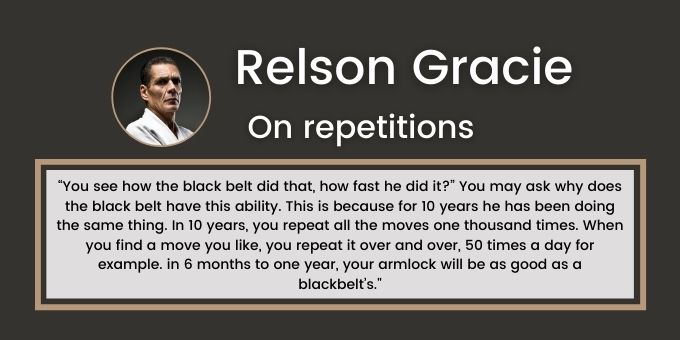
“You see how the black belt did that, how fast he did it?” You may ask why does the black belt have this ability. This is because for 10 years he has been doing the same thing. In 10 years, you repeat all the moves one thousand times. When you find a move you like, you repeat it over and over, 50 times a day for example. in 6 months to one year, your armlock will be as good as a blackbelt’s.
10. Bernardo Faria on focus
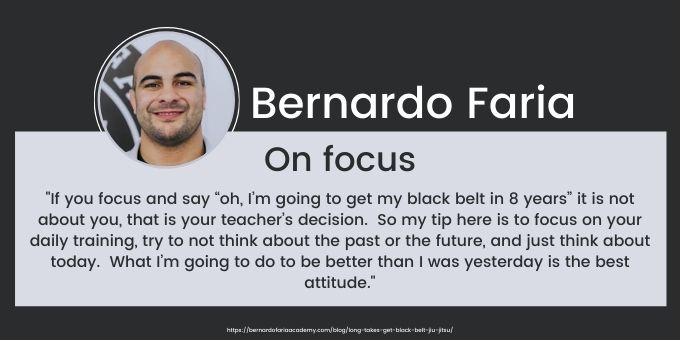
If you focus and say “oh, I’m going to get my black belt in 8 years” it is not about you, that is your teacher’s decision. So my tip here is to focus on your daily training, try to not think about the past or the future, and just think about today. What I’m going to do to be better than I was yesterday is the best attitude.
11. Jocko Willink on what matters
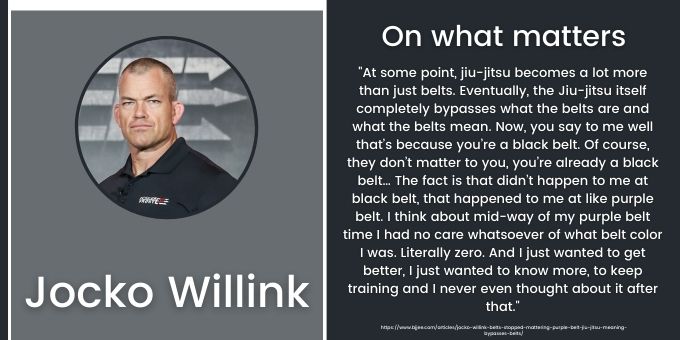
At some point, jiu-jitsu becomes a lot more than just belts. Eventually, the Jiu-jitsu itself completely bypasses what the belts are and what the belts mean. Now, you say to me well that’s because you’re a black belt. Of course, they don’t matter to you, you’re already a black belt… The fact is that didn’t happen to me at black belt, that happened to me at like purple belt. I think about mid-way of my purple belt time I had no care whatsoever of what belt color I was. Literally zero. And I just wanted to get better, I just wanted to know more, to keep training and I never even thought about it after that.
12 . Andre Galvao
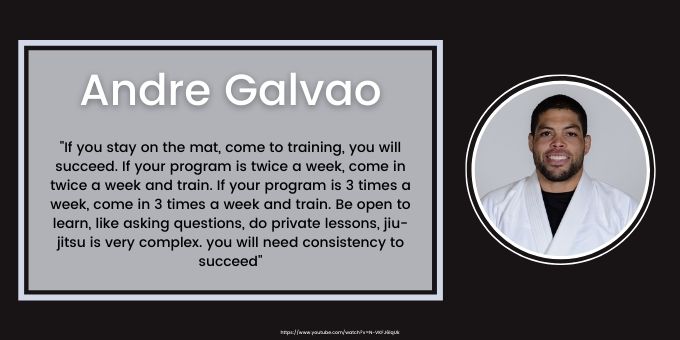
If you stay on the mat, come to training, you will succeed. If your program is twice a week, come in twice a week and train. If your program is 3 times a week, come in 3 times a week and train. Be open to learn, like asking questions, do private lessons, jiu-jitsu is very complex. you will need consistency to succeed
13. Marcelo Garcia on enjoying the process
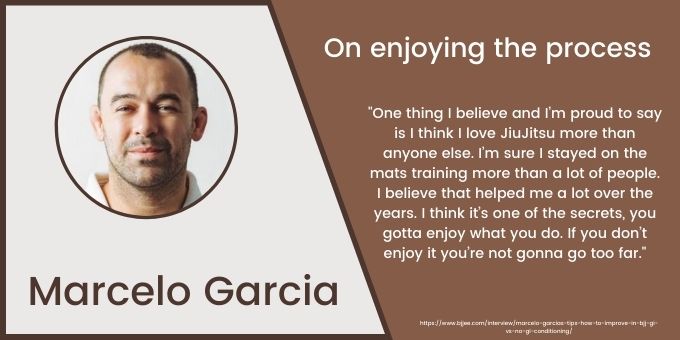
One thing I believe and I’m proud to say is I think I love JiuJitsu more than anyone else. I’m sure I stayed on the mats training more than a lot of people. I believe that helped me a lot over the years. I think it’s one of the secrets, you gotta enjoy what you do. If you don’t enjoy it you’re not gonna go too far.
14. Romulo Barral on proper promotions
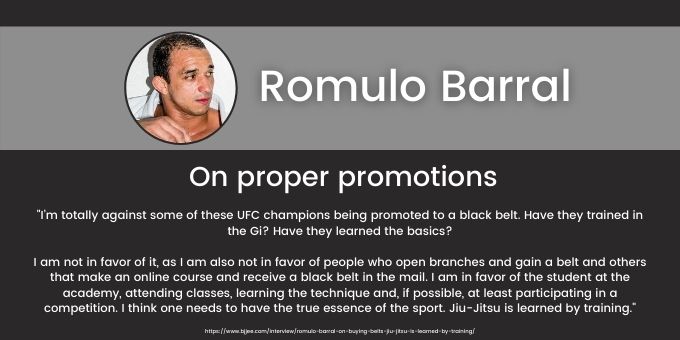
I’m totally against some of these UFC champions being promoted to a black belt. Have they trained in the Gi? Have they learned the basics?
I am not in favor of it, as I am also not in favor of people who open branches and gain a belt and others that make an online course and receive a black belt in the mail. I am in favor of the student at the academy, attending classes, learning the technique and, if possible, at least participating in a competition. I think one needs to have the true essence of the sport. Jiu-Jitsu is learned by training.
15 . Gabriel Arges on the blackbelt mindset
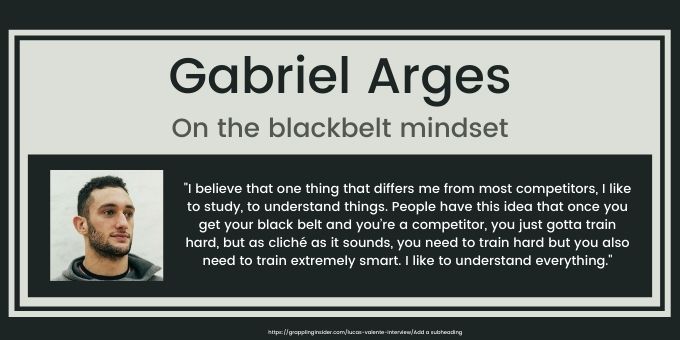
I believe that one thing that differs me from most competitors, I like to study, to understand things. People have this idea that once you get your black belt and you’re a competitor, you just gotta train hard, but as cliché as it sounds, you need to train hard but you also need to train extremely smart. I like to understand everything.
16. Roberto “Cyborg” Abreu on the responsibility of getting your Blackbelt
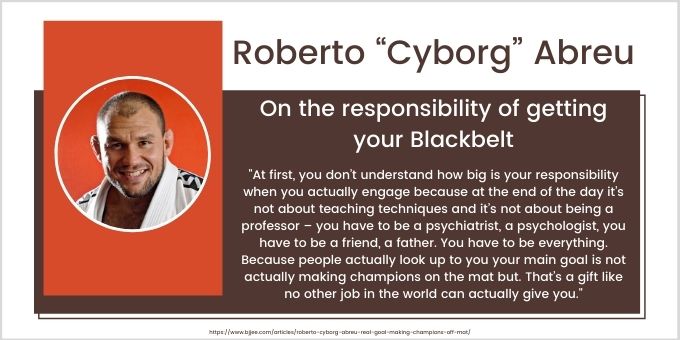
At first, you don’t understand how big is your responsibility when you actually engage because at the end of the day it’s not about teaching techniques and it’s not about being a professor – you have to be a psychiatrist, a psychologist, you have to be a friend, a father. You have to be everything. Because people actually look up to you your main goal is not actually making champions on the mat but. That’s a gift like no other job in the world can actually give you
17. Marcus “Buchecha” Almeida on starting out in Jiu-Jitsu
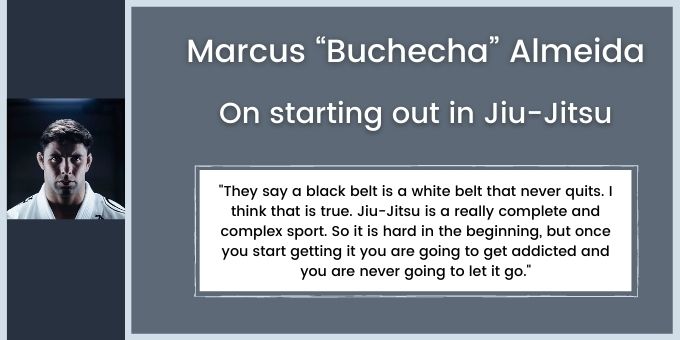
They say a black belt is a white belt that never quits. I think that is true. Jiu-Jitsu is a really complete and complex sport. So it is hard in the beginning, but once you start getting it you are going to get addicted and you are never going to let it go.
18. Mackenzie Dern on competing often throughout your jiu-jitsu journey

Competing trains your mind and your body. I think that’s why I am able to control my adrenaline so well at major tournaments. I have gone through the process so many times; the weight cut, the anticipation, testing myself against so many different people.
19. Rodolfo Viera on training at each belt level
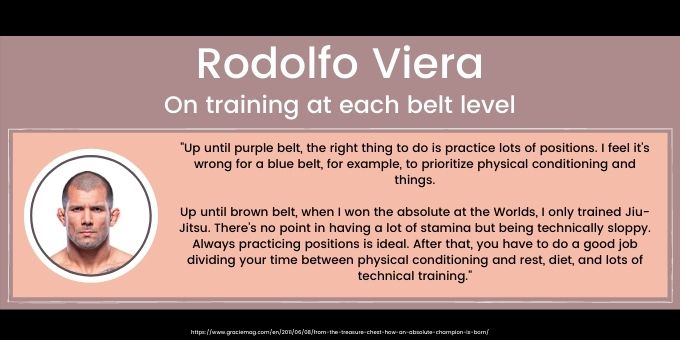
Up until purple belt, the right thing to do is practice lots of positions. I feel it’s wrong for a blue belt, for example, to prioritize physical conditioning and things.
Up until brown belt, when I won the absolute at the Worlds, I only trained Jiu-Jitsu. There’s no point in having a lot of stamina but being technically sloppy. Always practicing positions is ideal. After that, you have to do a good job dividing your time between physical conditioning and rest, diet, and lots of technical training.
20. Fabio Gurgel on what to expect at blue belt
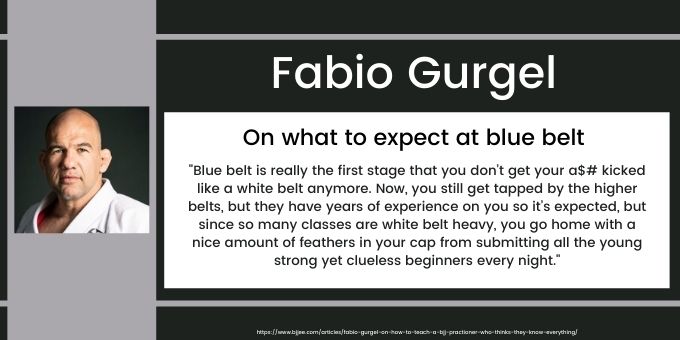
Blue belt is really the first stage that you don’t get your a$# kicked like a white belt anymore. Now, you still get tapped by the higher belts, but they have years of experience on you so it’s expected, but since so many classes are white belt heavy, you go home with a nice amount of feathers in your cap from submitting all the young strong yet clueless beginners every night.
21. Ryan hall on what it takes to reach blackbelt
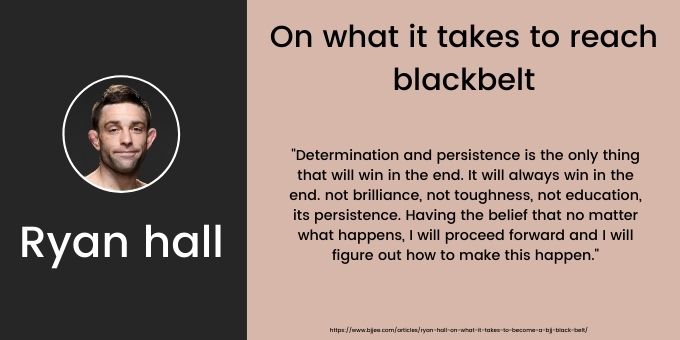
Determination and persistence is the only thing that will win in the end. It will always win in the end. not brilliance, not toughness, not education, its persistence. Having the belief that no matter what happens, I will proceed forward and I will figure out how to make this happen.
22. Roger Gracie on the proper competition mindset from white belt to black belt
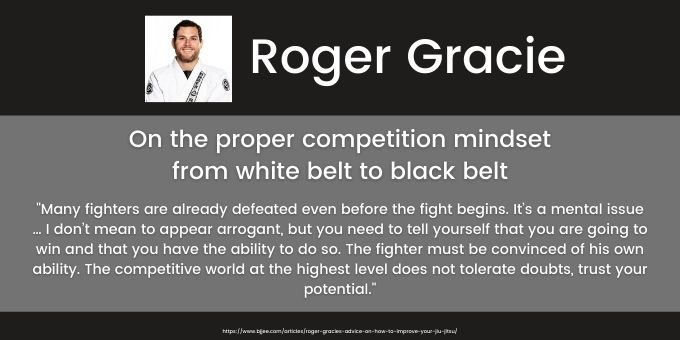
Many fighters are already defeated even before the fight begins. It’s a mental issue … I don’t mean to appear arrogant, but you need to tell yourself that you are going to win and that you have the ability to do so. The fighter must be convinced of his own ability. The competitive world at the highest level does not tolerate doubts, trust your potential.
23. Kron Gracie on choosing training partners
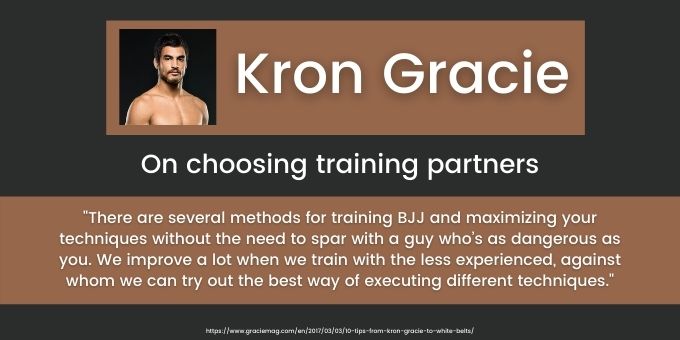
There are several methods for training BJJ and maximizing your techniques without the need to spar with a guy who’s as dangerous as you. We improve a lot when we train with the less experienced, against whom we can try out the best way of executing different techniques.
24. Leticia Ribiero on advice for women who do Jiu-jitsu
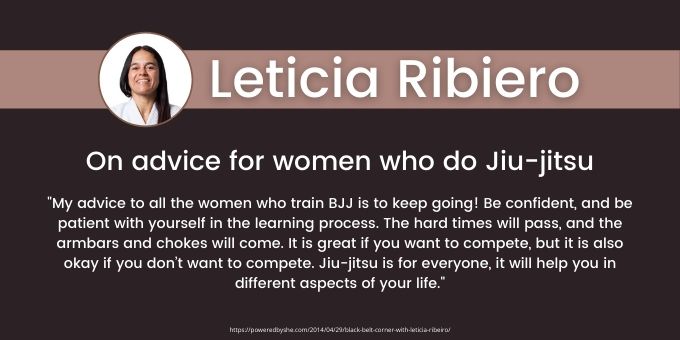
My advice to all the women who train BJJ is to keep going! Be confident, and be patient with yourself in the learning process. The hard times will pass, and the armbars and chokes will come. It is great if you want to compete, but it is also okay if you don’t want to compete. Jiu-jitsu is for everyone, it will help you in different aspects of your life.
25. Nicolas Meregalli on the journey to blackbelt
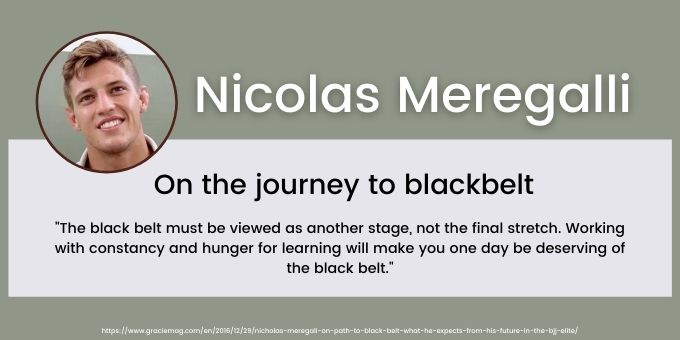
The black belt must be viewed as another stage, not the final stretch. Working with constancy and hunger for learning will make you one day be deserving of the black belt
